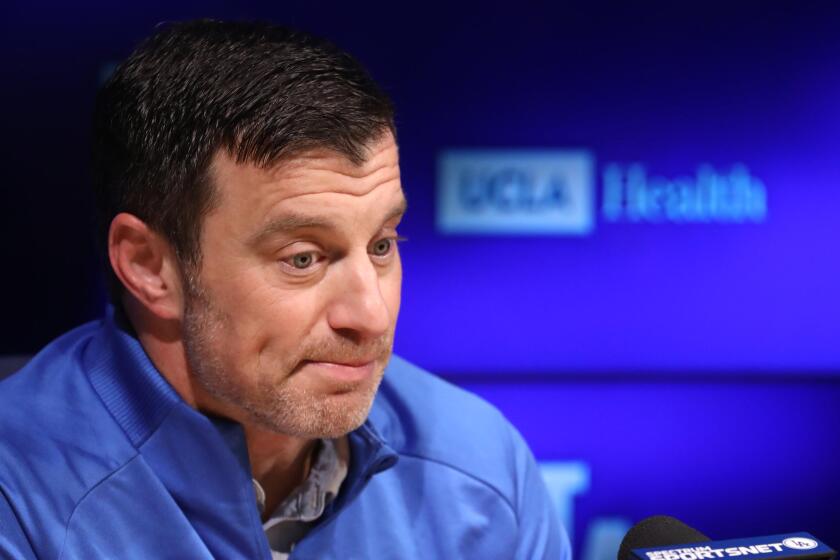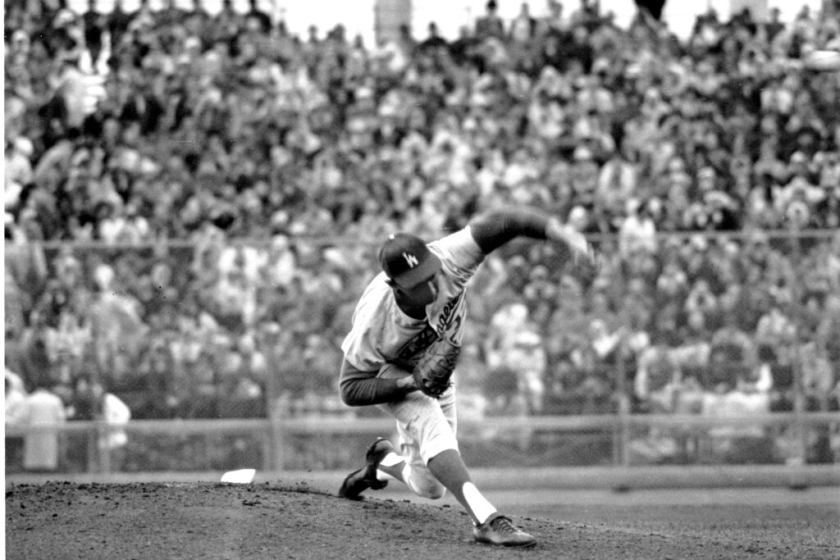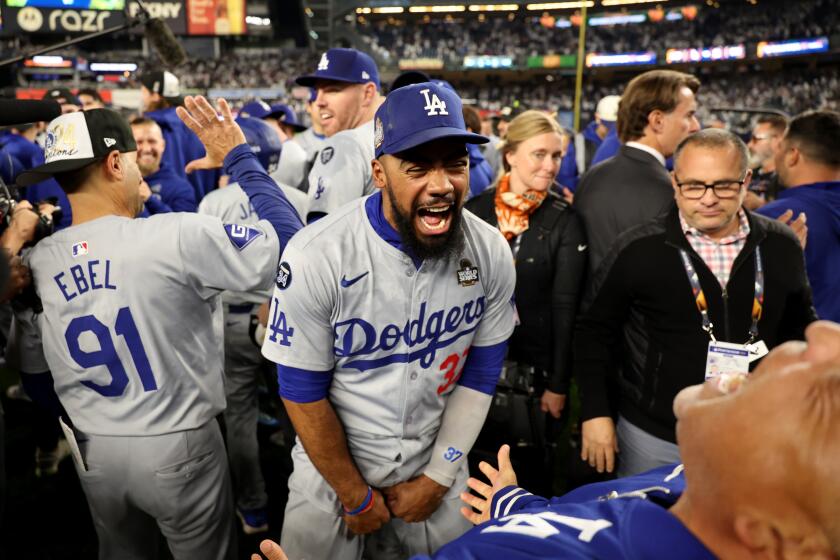Column: What can Dodgers do differently? Andrew Friedman has lots of remorse but no real answer
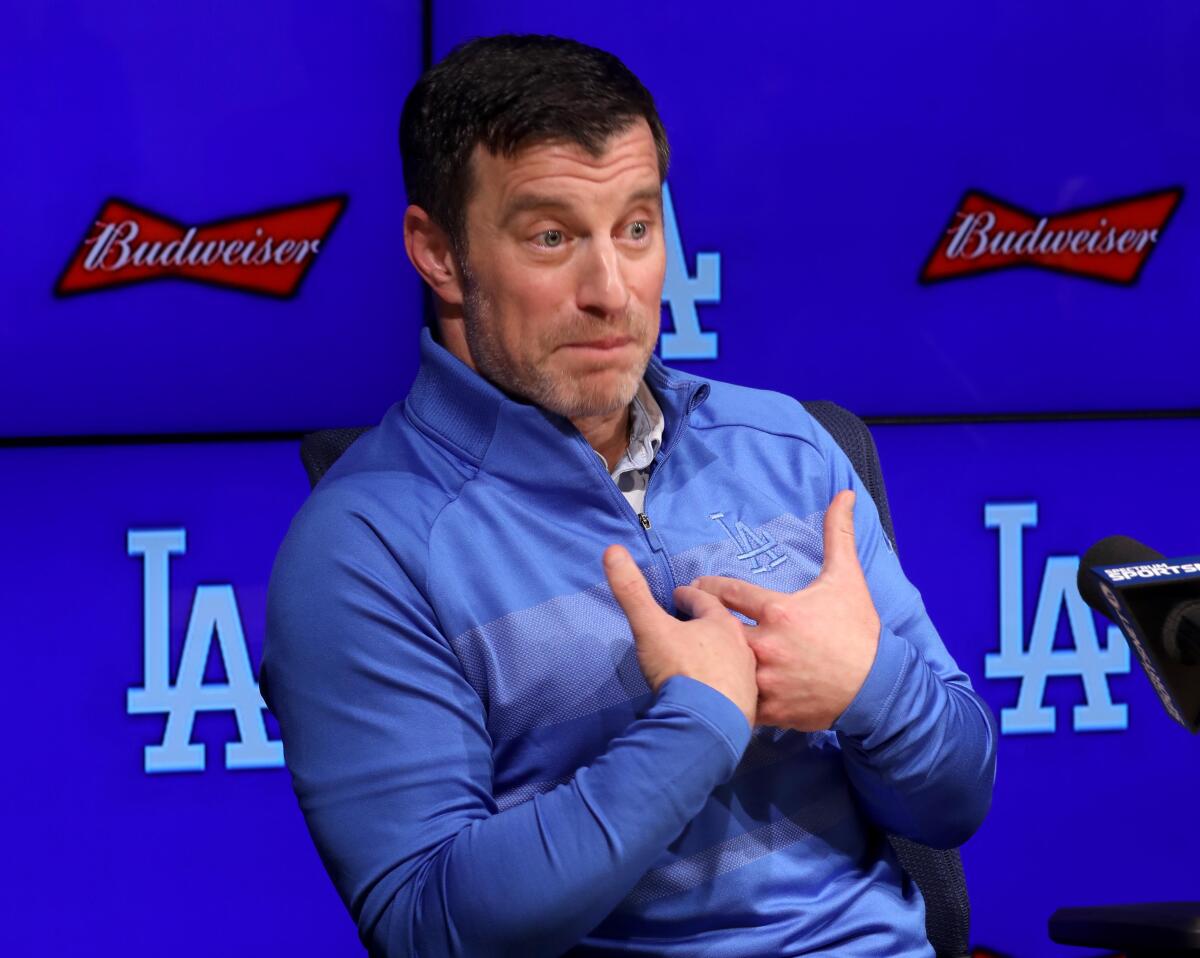
- Share via
Same windowless room. Same empty stadium. Same dreary weekday. Same long face.
Andrew Friedman hosted the media for a second consecutive disappointment seminar Tuesday after a second consecutive division series Dodgers postseason knockout, and the scene in the bowels of Dodger Stadium was all too familiar.
The team’s president of baseball operations sweated remorse, again. He gulped water from a giant bottle, again. He expressed shock, again.
“It’s fair to say it’s an organizational failure … our goal was to win 11 games in October and we didn’t win one,” he said.
He was more humble this time. He wasn’t confrontational. He seemed more chastened. His pain seemed more visible.
“I didn’t do a good enough job,” he said.
But once again, just like last year, despite addressing query after query, he couldn’t offer a decent answer to the only question that matters.
How on earth can you stop this from happening again?
“We need to figure out what we can do differently and how to go about it,” he said.
The Dodgers again were eliminated early in the postseason, but Andrew Friedman says manager Dave Roberts and his staff will return.
He acknowledged that in its effort to turn even one of its 10 recent full-season successes into a championship, the organization has reached a crossroads.
“We’re at that fork in the road, we get to choose,” he said. “Do we just lay down or do we keep fighting … this weekend I didn’t feel like ‘keep fighting’ was the right answer. But we’ve certainly gotten there.”
But he did not indicate how that fighting style would be different. He offered no tangible ideas regarding how that fight could work. His philosophy of building the best possible regular-season team and then rolling the dice in the playoffs still seemed very much part of that fight.
“There is an element that is October theater,” he said.
But he wouldn’t say how they could avoid another early curtain closing, even while acknowledging that something with this latest group of underachievers was askew.
“I do think that there’s good fortune that plays in … [but] we didn’t hold a lead in this division series,” he said.
“For a team this talented to play 27 innings where we do not hold a lead is beyond that ... it’s something we have to figure out and do what we can to put ourselves in a position to not have that happen.”
There should be no figuring involved. It’s the starting pitching, silly. Just say it. Starting pitching. Starting pitching. Starting pitching.
How could you watch the first three innings of the three losses to the Arizona Diamondbacks and not agree?
Friedman’s season-long acceptance of a threadbare rotation haunted them with the worst first three postseason starts — 4 2/3 innings total — in major league history.
Clayton Kershaw was too injured. Bobby Miller was too young. Lance Lynn was too bad. Their combined 25.07 earned-run average was too unreal.
While many folks will say that Mookie Betts and Freddie Freeman’s combined one-for-21 performance was the singular reason the series was doomed, they and the rest of the Dodgers’ offense were swinging uphill all series.
Their starting pitching put them in a deep, early hole in each of the three games, and the bats just couldn’t catch up.
Friedman is one of those who believe the offense was the issue — “Because it was unexpected. If you would have said your pitching staff would have given up four runs [each] in Games 2 and 3, I would’ve bet a lot of money that we would have won at least one of those two games with our offense.”
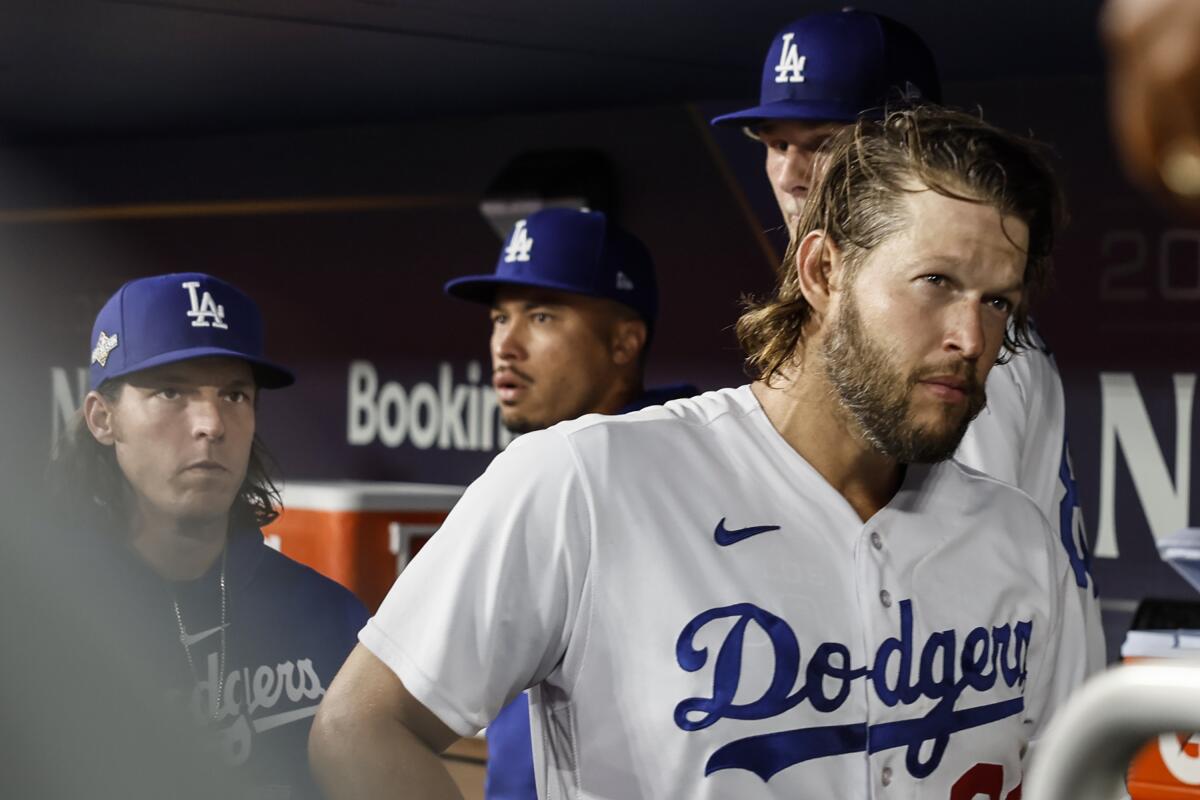
But far more startling was the starting pitching, yet, given every chance Tuesday to agree that the Dodgers’ downfall was in their rotation, Friedman didn’t bite.
“There are a number of things that played out this year that were unforeseen by us,” he said, later adding, “I think from a 13-man pitching staff, I do think that there was enough arm talent there.”
First, he’s right about the unforeseen, from Julio Urías’ suspension to the injuries suffered by Dustin May and Tony Gonsolin.
But there was enough arm talent there? Not a chance. The bullpen arms were outstanding, but the Dodgers desperately needed what they needed all season — a starting pitcher or two who could take the ball and give them six or seven strong innings.
“The question is, how many of them are there on planet Earth?” he said.
Funny he should mention that.
Two of them are in Texas, where Jordan Montgomery and Nathan Eovaldi grinded to wins for the Rangers against Houston in the American League Championship Series.
Those are two pitchers who the Dodgers could have acquired, with Eovaldi available last winter and Montgomery available at the trade deadline. Instead, Friedman signed Noah Syndergaard in the winter and traded for homer-harried Lynn.
“There aren’t too many guys going six or seven in postseason games, anecdotally, as I look around,” Friedman said.
Yet there have been six such pitchers to work at least six innings in the postseason already.
“I prefer that personally for a starting pitcher to take the ball and do that,” Friedman said. “There’s just fewer and fewer of them every year, so therefore the supply is more limited. It’s just harder to access.”
We conclude the countdown of the 25 greatest Dodgers of all time with the greatest person in franchise history.
When pressed, Friedman vowed to strive to access those arms this winter, looking for at least one veteran ace to complement a staff that includes promising kids Miller, Emmet Sheehan and Ryan Pepiot, along with the returning Walker Buehler.
“We’ll certainly be focused on starting pitching for sure,” he said. “And it’s how to balance the young guys … with Walker Buehler coming back, and then the market, whether it’s through trade or free agency.”
You want to believe him. You want to believe that the Dodgers’ baseball boss will make a legitimate effort to sign a couple of strong innings eaters.
You hope that he won’t just bring in three mediocre — read: lower-priced — arms while spending all of his time and resources attempting to sign that guy who won’t pitch for at least a year, name of Shohei Ohtani.
There is a clear answer to the Dodgers’ recent postseason woes. But while Friedman addressed it Tuesday, he didn’t seem to embrace it as he walked away from that windowless room into the bright sun of another lost October.
More to Read
Are you a true-blue fan?
Get our Dodgers Dugout newsletter for insights, news and much more.
You may occasionally receive promotional content from the Los Angeles Times.

